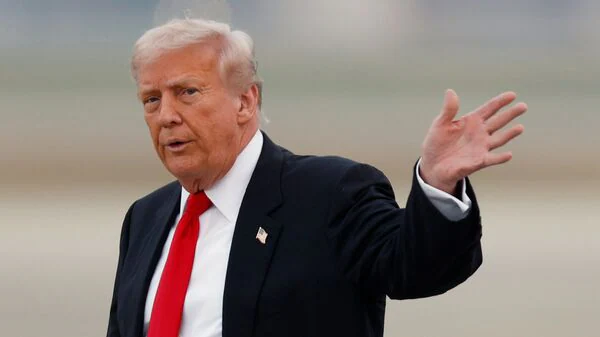
US Government Shutdown: Is The Shutdown Over? Which Democrats Voted With Republicans Today? All Faqs Answered
The bill received exactly the 60 votes needed to advance in the Senate, passing compromise legislation to fund the government and hold a later vote on extending Affordable Care Act tax credits that expire January 1.
As many as 14 previous Senate votes fell short of the 60 votes needed to move the legislation forward.
Sunday's test vote marked a significant breakthrough in the Senate, as eight Democrats broke with other members of the Senate Democratic leadership to advance the package. There was only one Republican who voted against the deal.
Who were these Democrats who voted with Republicans today? Is the government shutdown over now? What happens next? Here's all the latest you need to know about the US government shutdown
Is the government shutdown over now?No. It's a long way before the US government shutdown ends. According to US media, the final passage of the legislation could take several days if Democrats object and prolong the process.
According to CNN, any one senator can delay consideration of the package for several days. Additionally, the House will have to return and adopt the deal struck in the Senate before it is sent to President Donald Trump's desk.
The test vote on Sunday marked the start of what could be a lengthy series of procedural votes in the Senate
How long has the government been shut down?It has been 40 days since the US government shut down on October 1. It's the longest in the US history.
Before this, the longest US government shutdown in history lasted 35 days in 2018, under US President Donald Trump's first term. It ended in January 2019.
Credit: Congressional Research Service Why did the government shut down in 2025?A government shutdown occurs when Congress is unable to pass the funding bills-known as appropriations-that keep federal agencies running into the next fiscal year, which begins on October 1.
Republicans supported a short-term measure to fund the government generally at current levels through November 21, but Democrats blocked it, insisting the measure address their concerns on health care.
Democrats want to reverse the Medicaid cuts in Donald Trump's mega-bill passed this summer, and extend tax credits that make health insurance premiums more affordable for millions of people who purchase through the marketplaces established by the Affordable Care Act.
What happens next?After Sunday's voting, the US Senate will continue considering legislation to reopen the government after the test vote on Sunday advanced the spending bill.
It will now be amended to include the broader funding package before heading back to the House for final passage.
Once cleared by both chambers, the bill would go to President Trump's desk to end a shutdown that has paralysed federal operations for more than a month.
The entire process could take several more days.
House members have already been notified that votes related to government funding are expected in the lower chamber this week, pending final passage of the funding measure in the Senate.
How many US senators are there? Which Democrats joined Republicans on the vote?The US Senate consists of 100 members, two from each of the 50 states. The measure, which needed 60 votes to advance
Senate Democratic leader Chuck Schumer of New York voted against moving ahead with the package, along with all but eight of his Democratic colleagues. Eight Democrats who voted in favour of the deal were:
1. Sen. Dick Durbin of Illinois
2. Sen. Angus King of Maine (independent who caucuses with Democrats)
3. Sen. Catherine Cortez Masto of Nevada
4. Sen. Jacky Rosen of Nevada
5. Sen. John Fetterman of Pennsylvania
6. Sen. Tim Kaine of Virginia
7. Sen. Jeanne Shaheen of New Hampshire
8. Sen. Maggie Hassan of New Hampshire
Only one Republican, Sen. Rand Paul of Kentucky, voted 'no'. Three conservative senators - Mike Lee of Utah, Rick Scott of Florida and Ron Johnson of Wisconsin - held back their votes until voting was nearly over as they engaged in deep conversations on the floor with Senate Majority Leader John Thune and other senior Republicans.
What's deal that Democrats, Republicans agree to?Eight Democrats and Republicans had earlier agreed to a deal that included:
1. Reversing the mass firings of federal workers by the Trump administration since the shutdown began on October 1 and ensuring that federal workers receive back pay.
It would also protect against future reductions in force through January and guarantee federal workers would be paid once the shutdown is over.
2. Bipartisan bills worked out by the Senate Appropriations Committee to fund parts of the government - food aid, veterans programs and the legislative branch, among other things.
3. All other funding would be extended until the end of January -- in exchange for a mid-December vote on extending the health care tax credits.
The resolution will now be amended to include three longer-term appropriations bills, as well as an extension of the short-term stopgap measure passed by the House in September.
The original House bill would have extended government funding until November 21. It would now extend the rest of the government funding until late January in exchange for a mid-December vote on extending the health care tax credits.
Legal Disclaimer:
MENAFN provides the
information “as is” without warranty of any kind. We do not accept
any responsibility or liability for the accuracy, content, images,
videos, licenses, completeness, legality, or reliability of the information
contained in this article. If you have any complaints or copyright
issues related to this article, kindly contact the provider above.


















Comments
No comment